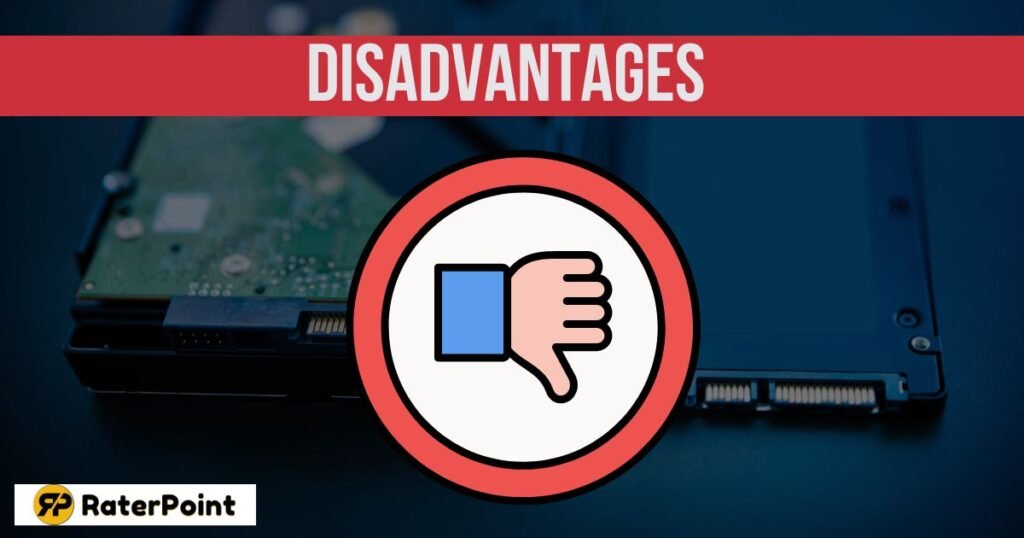SSD Advantages and Disadvantages

A Solid State Drive (SSD) is a storage device. It is faster than a Hard Disk Drive (HDD). SSDs use flash memory to store data, unlike HDDs. HDDs are slower because they have moving parts. SSDs do not have these moving parts, making them durable.
This durability is suitable for computers as it reduces wear and tear. Also, SSDs load programs faster than HDDs. This means a computer with an SSD starts quickly. Another benefit is that SSDs are quieter because they do not use parts.
Pricewise, SSDs can be more expensive per gigabyte. However, the speed benefits are often worth it. Overall, SSDs offer many advantages over HDDs. Understanding these differences is critical to choosing the proper storage. So, we cover the advantages and disadvantages of SSDs in this article.
Advantages of SSDs

First, we discuss the advantages of SSDs, which are given below.
Performance
SSDs are fast. They read because it saves time. SSDs are great. They make tasks easy. Reading files is a snap. Writing files is fast. Everything loads quickly. Data transfer is swift. Enjoy faster use. SSDs only lag a little.
Reliability
SSDs are durable. They have no moving parts, which means less risk and less chance of damage. They are sturdy and last long. SSDs are reliable and have fewer physical issues. Hard drives fail more.
SSDs are tough and withstand shocks. They’re safer for data. There is less. They consume less power. They generate less heat, too. They are energy efficient, and they have longer battery life. SSDs stay calm, which reduces failures and extends device life. They are efficient and secure.
Durability
SSDs last longer and have more cycles. They endure well and can last years. SSDs are rugged and no moving parts help. They resist shocks and dropping is okay.
SSDs still work and are also steady. They resist vibrations. This keeps data safe and ensures its reliability. Breakdowns are rare. Its secure storage and devices last longer.
Noise: Completely Silent Operation
- SSDs are silent.
- They make no noise.
- Why? No moving parts.
- HDDs are loud.
- They spin and click.
- SSDs do not spin.
- No clicks are heard.
- Your room stays quiet.
- No noise distraction.
- Peaceful computer use.
- Quiet work is best.
- Noise can bother you.
- SSDs keep it calm.
- Perfect for silence lovers.
- Enjoy a soundless setup.
Disadvantages of SSDs

Now, we discuss the disadvantages of SSDs, which are given below.
Cost: Higher Price Per Gigabyte Compared to HDDs
SSDs cost a lot more. Their price per gigabyte is high, and they are much pricier than HDDs. This can affect buying choices. Spending gets higher with SSDs. Many people find it expensive. HDDs give more space for less money. Budget shoppers often pick HDDs.
SSD prices may limit choices. The high cost can change plans. It is a money issue for some. Think about the cost before buying. Balance value with budget needs.
Capacity: Generally Lower Storage Capacities at Affordable Prices
SSDs typically offer less space. Their capacity often needs to be improved compared to traditional HDDs, which can store more data.
High-storage SSDs are costly, and users who require extensive storage usually find their needs unmet. As media files like videos and music are large, space fills quickly on smaller SSDs. Additionally, gamers face challenges since modern games demand significant space.
Managing data efficiently becomes tricky as users strive to stay in the room. Therefore, always consider your storage needs before choosing an SSD to ensure it aligns with your usage expectations.
Data Recovery
When comparing SSDs with standard HDDs, data recovery can be more complex and costly. If an SSD fails, retrieving lost data becomes more accessible. Unlike HDDs, SSDs use chips to store information, which means there are no spinning disks to repair.
When these chips fail, recovering data requires specialized skills and tools, often making the process more expensive. Users may need professional help to salvage their data, and this complexity can make SSD recovery a taxing endeavor.
Consequently, SSD users must be cautious and regularly back up important data to mitigate potential losses.
Lifespan: Limited Number of Write Cycles
SSDs have limits. Write cycles matter. Each write counts. Data writing wears out. Writing reduces lifespan. Improvement exists now. Technology advances help. More cycles now exist. SSDs still have limits. HDDs write indefinitely.
SSDs wear over time. Write cycles are natural. SSDs cap writes slightly. Improved tech helps SSDs. Writing wears them down. Care for your SSD.
Also Read: How Many SSD Slots Does a Motherboard Have
Applications and Suitability
Best Use Cases for SSDs
SSDs excel in specific situations. They are ideal for gaming, offering rapid load times and responsive performance. This speed enhances gaming experiences, reducing wait times between scenes.
Video editing also benefits significantly from SSDs due to fast read and write speeds, allowing editors to render and process media files efficiently.
High-performance computing tasks, such as data analysis and 3D modeling, thrive with SSDs as they handle large datasets and software demanding swift data access.
Situations Where HDDs Might Still Be Preferred
Despite SSDs’ advantages, HDDs are still chosen for specific needs. They offer cost-effective mass storage options, holding vast amounts of data affordably. HDDs are ideal for archival purposes where data retrieval is rare and quick access is unnecessary.
In cost-sensitive scenarios where budget constraints exist, HDDs provide more capacity for less money, appealing to those not requiring the speed of SSDs. Additionally, HDDs serve well for secondary storage, backing up files economically.
FAQs
What is an SSD?
Solid-state drives (SSDs) are storage devices that store data on flash memory. They are faster and more reliable than HDDs because they contain no moving parts. At a lower technological advancement cost, they offer enhanced performance and efficiency.
What is the lifespan of an SSD?
An SSD typically lasts 3 to 5 years, depending on usage and performance. However, some SSDs can last 10 years or longer with proper management and technological advancements.
What are the benefits of using an SSD?
SSDs are speedy and reliable. They boot up fast, are quiet, and consume less power. They also keep data safe. SSDs resist shock and vibration, making them durable. They also offer efficient operation, extended device life, and secure storage.
How much data can an SSD store?
An SSD can hold from 128 GB to several terabytes. Smaller SSDs suit basic tasks, while larger ones store more data. Choose by need.
Is a 256GB SSD better than a 1 TB hard drive?
A 256GB SSD offers faster task speeds, but a 1TB HDD gives more room for data. Choose fast apps or significant storage needs based on what you need most.
Conclusion
In conclusion, choosing a storage drive depends on your needs. SSDs are fast and reliable. They make computers work quicker. They have no moving parts, so they last longer. However, SSDs are costly and hold less data. You may get more room for less money using HDDs.
HDDs do, however, include moving parts that can break down and be noisy. If speed matters, pick SSDs. If saving money and storing a lot of data are priorities, HDDs are the better choice. Think about what you need most: speed or space. Also, think about the noise level you can handle.
Consider how much money you can spend. Pick a drive that best fits how you use your computer.

